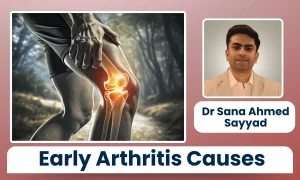You know that feeling. The deep, persistent throb in your joints that seems to set the rhythm for your entire day. It’s the reality for millions living with psoriatic arthritis (PsA). But what often goes unseen, what simmers just beneath the surface of the skin and swollen joints, is the profound impact on mental health. This isn’t just about “feeling a bit down.” This is a deep, systemic connection where physical pain and emotional distress are tangled together, each one feeding the other.
It’s Not In Your Head (But It Affects It): The Stress-Inflammation Cycle
Let’s get one thing straight right away. The mental health challenges that come with PsA are not a sign of weakness. They’re a physiological response. Think of your body as an overzealous alarm system. Chronic pain and inflammation are the blaring sirens. This constant state of alert floods your system with stress hormones like cortisol.
Well, here’s the cruel twist: chronic stress itself can actually worsen inflammation. It’s a vicious, exhausting feedback loop. Your pain causes stress and anxiety, and that stress and anxiety then amplify your pain. Your body gets stuck in a fight it can’t win, and your mind is caught in the crossfire.
The Common Mental Health Challenges
1. Depression and Anxiety
These are the two most frequent, unwelcome companions. The numbers don’t lie—people with PsA are significantly more likely to experience depression and anxiety disorders. It makes sense when you think about it. The relentless pain, the fatigue that feels like you’re wading through cement, the uncertainty of flare-ups… it’s a perfect storm for hopelessness and worry.
2. “Psoriatic Arthritis Fatigue”
This isn’t just “being tired.” This is a bone-deep exhaustion that rest doesn’t fix. It’s the kind of fatigue that cancels plans, makes concentration impossible, and steals the joy from activities you once loved. This level of fatigue is a massive driver of mental distress, creating a sense of isolation and frustration.
3. Social Isolation and Loneliness
Chronic illness can be incredibly isolating. Maybe you cancel one too many times. Perhaps you feel self-conscious about visible plaques or swollen joints. Or maybe you just don’t have the energy to pretend you’re okay. Slowly, your world can shrink. This withdrawal feeds directly into depression, creating a lonely echo chamber of pain.
Beyond the Obvious: The Cognitive Impact of PsA
This one surprises a lot of people. Many with PsA report experiencing “brain fog”—trouble with focus, memory lapses, and a general feeling that your brain is moving through sludge. Is it the inflammation affecting the brain? The distraction of constant pain? The side effects of medication? Honestly, it’s likely a combination of all three. This cognitive impact can affect work, relationships, and your overall sense of self, adding another layer of mental strain.
Breaking the Cycle: Strategies for Protecting Your Mental Wellbeing
Okay, enough about the problem. Here’s the deal: while you can’t just wish these feelings away, you are far from powerless. Managing the mental load of PsA requires a multi-pronged approach, just like managing the physical symptoms.
1. Talk About It (Seriously, Talk)
First and most important step: bring it up with your healthcare team. Your rheumatologist needs to know you’re struggling. They are not just joint doctors; they’re managing a whole-body disease. They can:
- Rule out other medical causes for your fatigue or mood changes.
- Adjust medications if side effects are contributing.
- Refer you to a therapist or psychiatrist who understands chronic illness.
2. Embrace Therapy
Therapy isn’t about someone telling you to “think positive.” Modalities like Cognitive Behavioral Therapy (CBT) are incredibly effective for chronic illness. CBT gives you practical tools to:
- Reframe negative thought patterns.
- Develop coping strategies for pain and anxiety.
- Manage the “catastrophizing” that often happens before a potential flare.
3. Find Your Movement Groove
I know, I know. The last thing you want to do when you hurt is move. But gentle movement—like swimming, walking, or yoga—can be a game-changer. It helps reduce stiffness, boosts endorphins (those natural mood elevators), and gives you a sense of agency over your body again.
4. Connect with Your Tribe
Finding a support group, whether online or in person, can be life-altering. Suddenly, you’re talking to people who get it. They understand the weird frustrations, the invisible pain, the small victories. That validation is a powerful antidote to isolation.
A Quick Guide to the Mind-Body Tools
| Tool | How It Helps Mental Health with PsA | Simple Way to Start |
| Mindfulness & Meditation | Reduces stress reactivity, helps observe pain without panic, improves sleep. | Try a 5-minute guided meditation app. Focus on breath, not emptying your mind. |
| Gentle Exercise | Releases endorphins, combats fatigue, maintains joint function and mood. | A 10-minute walk. Water aerobics. Focus on motion, not intensity. |
| Prioritizing Sleep | Poor sleep worsens pain perception and emotional regulation. It’s foundational. | Set a consistent bedtime. Make your room cool and dark. Limit screens before bed. |
You Are More Than Your Diagnosis
Living with psoriatic arthritis is a journey—a tough one, no question. It asks you to pay attention to signals others can ignore. But in caring for your mind with the same urgency as your joints, you do more than just manage symptoms. You reclaim a piece of yourself. You acknowledge that the ache in your heart is as real as the ache in your hands, and that treating both is the truest form of healing.







More Stories
Managing Arthritis as a Young Adult or Millennial: Social, Career, and Relationship Considerations
Assistive Dressing Devices and Clothing Adaptations: Reclaiming Independence, One Garment at a Time
Adaptive Gardening Techniques for Arthritis Sufferers: Reclaim Your Joy, One Seed at a Time